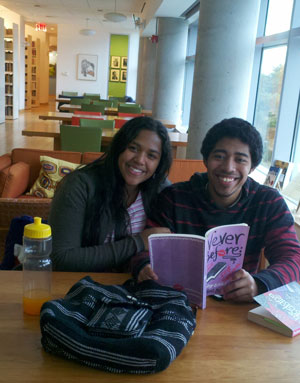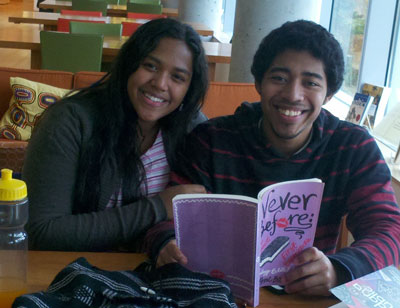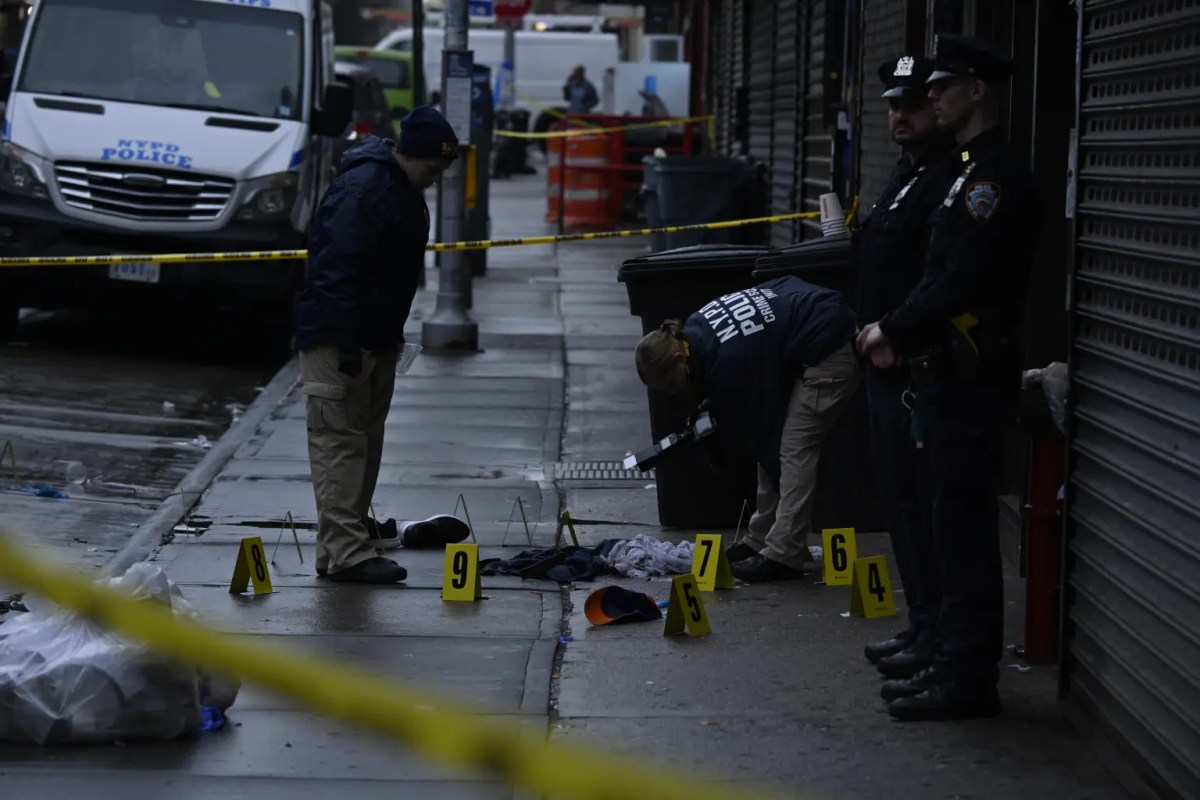
BY HEATHER DUBIN | Cold weather should not be a deterrent for a visit to Poets House. The journey is worth the effort to reach this literary gem tucked away near the Hudson River in Battery Park City.
Poets House is a writer’s delight with a library of 50,000 volumes of poetry and a well-lit space to work with a view of the river. Open to the public and free, the “green” building is also host to exhibitions and programs for readings and writing workshops.
Previously located in a Soho loft, and a home-economics classroom at Chelsea’s High School for the Humanities before that — where cabinets were packed to the brim with slim poetry books — the 29-year-old cultural institution continues to grow and reach a wider audience at 10 River Terrace.
In a recent interview, Suzanne Lunden, publicity and marketing coordinator, led a tour of the duplex, followed by an extensive talk with Lee Briccetti, Poets House executive director. Both women are poets, and Briccetti, author of “Day Mark,” is coming up on her 25th anniversary at Poets House.
“I’m not a founder, but I’m a mommy,” Briccetti said, as she acknowledged the many people who worked together to bring the literary center to its new space, which opened in September 2009. Poets House was founded by Elizabeth Kray, an arts administrator, and Stanley Kunitz, an award-winning poet, in 1985.
Poets House has signed a rent-free lease with the Battery Park City Authority through 2069. As part of the agreement, the literary center raised $11.2 million over seven years for construction, from public and private sources. Its 18-member board of directors donated $2.2 million, and the city put up $3.5 million.
To help fundraising, Poets House reached out to artists listed in Kunitz’s maroon leatherbound journal, where he kept track of attendance, seating arrangements and food consumed at dinner parties over 13 years. On New Year’s in 1967, Kunitz recorded “John Ashbery, the Lowells, Rothkos, Gustins and Lee Pollock” at a party with two cases of champagne for 51, scotch and gin, and cake, cookies and tangerines.
“He had a lot of cultural capital,” Briccetti said.
“In 2069, the lease of Battery Park City reverts back to the city,” Briccetti said. “Will they renegotiate to be a separate entity or will the city take over?”
Meanwhile, Poets House has 55 years to concentrate on what they do best, which is making poetry accessible.
“It’s the whole history of the human voice that we’re trying to invite people into,” Briccetti said. “It’s a wide smorgasbord, and you will find something you will like to eat.”
This is a lot easier to do, in terms of events, in the 11,000-square-foot, custom-designed interior by architect Louise Braverman.
“We can do four to five things at a time. We couldn’t in the last space, it was one room before,” Briccetti said.
Kray Hall, named for its founder, holds 90 people for readings and talks. The beechwood floor is from a local forest in Pennsylvania, and yellow velvet curtains cover glass garage doors that lead to large rocks outside for summer overflow of patrons at Poets House.
A children’s room has some books, and beanbags — but the real draw is three vintage typewriters for use, including a Smith Corona and two Royals, one black and one electric blue, which sit on old-time school desks. Poets House has many class visits, and children may be inspired by poetry dioramas stored in the drawers of a card catalog from another era.
For an older crowd, there are exhibits upstairs in the main space, where letters from poets and original works can be seen under lock and key in museum-grade containers. Additionally, there is an extensive library of poetry books to peruse.
“We have all the new poetry journals on the shelf. It’s our goal to have them accessible to young writers, they are pricey,” Lunden said. The noncirculating material entices people who spend the entire day at Poets House amongst five tables, two sofas and a quiet reading room.
Poets House also has the only open stack of chapbooks, small volumes of poetry.
“If you’re doing research, it’s good to go back and flip through the archived journals,” Lunden said. “ ‘Oh, this was when Billy Collins [U.S. poet laureate] was getting big,’ and you go back, and it’s his first work.”
A multimedia center contains tapes, CDs and records, with some dating back to the 1930s. The next corridor displays the writing desk of the poet E.E. Cummings, where you can touch the place he sat down to write, and rifle through the drawers.
Offices in the back are for 12 full-time and part-time staff, and where the special collection of first editions and rare books are kept, along with founder Kunitz’s assortment of treasures, such as chess pieces and a salt box.
“This place is gorgeous. It’s a snow day, but people come, Briccetti said, speaking last Friday. “Usually it’s packed.”
She had her reservations about the location, thinking it was too far west, however, foot traffic has tripled since their move.
The affluent community was also a consideration. “The first part of our mission is to serve poets. They aren’t wealthy,” Briccetti said, “It was really a commitment.” Together, poets and stakeholders made sure the center would serve everyone.
Last year, Poets House expanded beyond the neighborhood by introducing 14,000 students, parents and educators to the center for class trips and otherwise. Many teenagers are repeat returners.
“We don’t think poetry should just be for people with PhDs,” Briccetti said. “Every culture has poetry. This place has access to all these books, and many points of entry to kids and adults.”
Poets House excels at teaching librarians how to make poetry come alive. They conduct training sessions and help libraries implement changes to entice readers.
Poets House also built a bridge between libraries and zoos by establishing a poet in residence at six American city zoos.
“Language can really bring people together,” Briccetti said. “Five million people have seen the poems in various cities, and the zoos tested the results, which made people think more deeply about what they were seeing.”
From this success, Poets House is using the same idea to spread poetry of the Muslim world. Five cities with a high Muslim population were chosen, and the program — Poetic Voices of the Muslim World — will expand to four more cities.
“We were the only nonacademic library to get this award, along with our partner City Lore, from the National Endowment for the Humanities because poetry is so loved in the Muslim world,” Briccetti said. “It brought people in who have never been in libraries before.”
Briccetti is hopeful that New York City’s first lady, Chirlane McCray, who is a published poet, will help spur a revitalization in poetry.
“Her interest would mean so much,” Briccetti said. “It would be great to meet and work with her.”
And, yes, that is an invitation.
“We believe art can help you apprehend more about yourself,” Briccetti said. “I feel poetry is like opera and baseball — you need to be invited in. We want to invite people in.”


















